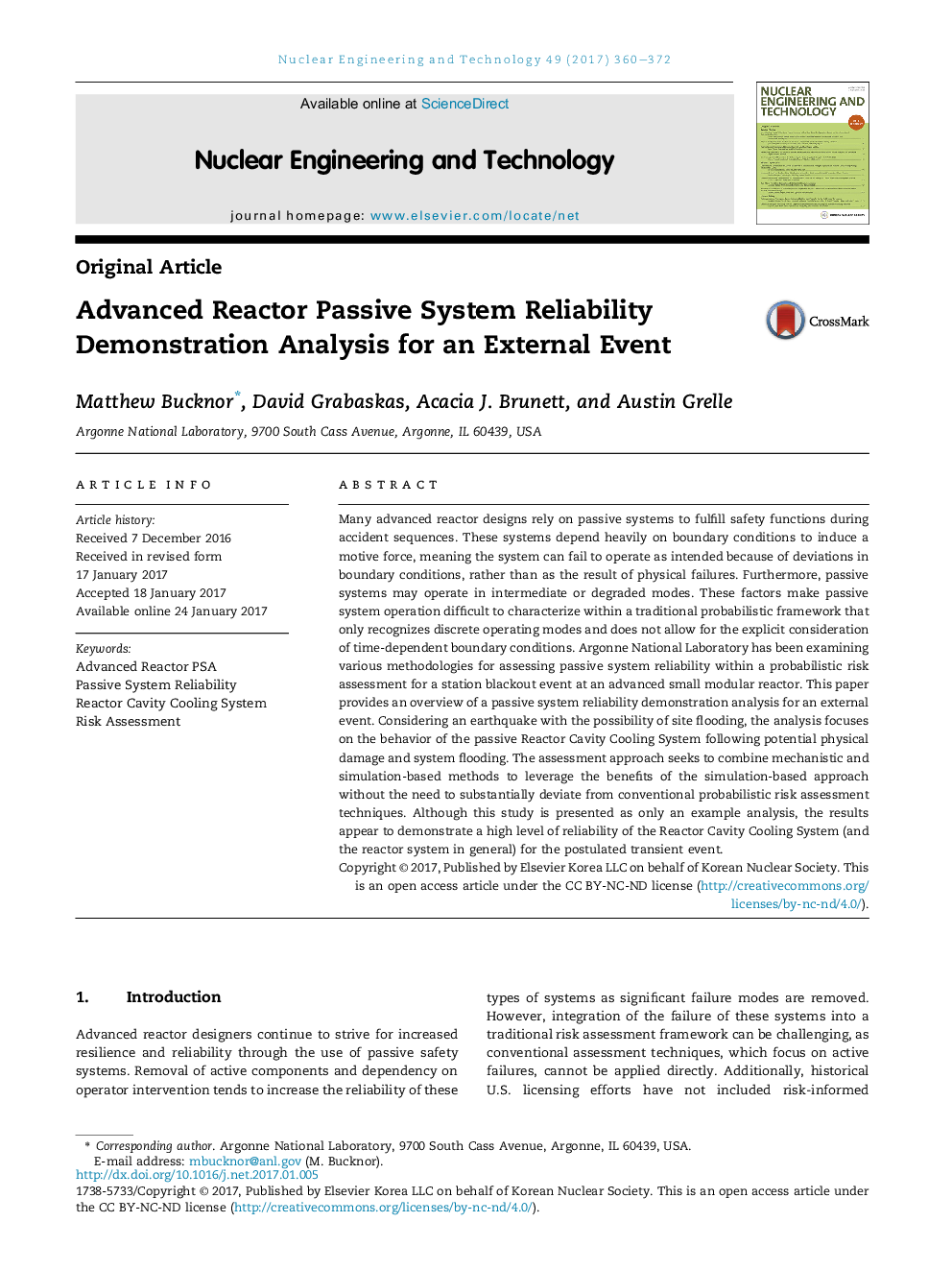| کد مقاله | کد نشریه | سال انتشار | مقاله انگلیسی | نسخه تمام متن |
|---|---|---|---|---|
| 5477987 | 1399250 | 2017 | 13 صفحه PDF | دانلود رایگان |
عنوان انگلیسی مقاله ISI
Advanced Reactor Passive System Reliability Demonstration Analysis for an External Event
ترجمه فارسی عنوان
تجزیه و تحلیل تست قابلیت اطمینان سیستم پیشرفته راکتور پیشرفته برای یک رویداد خارجی
دانلود مقاله + سفارش ترجمه
دانلود مقاله ISI انگلیسی
رایگان برای ایرانیان
کلمات کلیدی
ترجمه چکیده
بسیاری از طرح های پیشرفته راکتور بر سیستم های منفعل تکیه می کنند تا در طول وقایع حادثه، عملیات ایمنی را انجام دهند. این سیستم ها به شدت به شرایط مرزی برای ایجاد نیروی حرکتی بستگی دارد، به این معنی که سیستم می تواند به علت انحراف در شرایط مرزی، به جای آنکه به علت شکست فیزیکی باشد، کار کند. علاوه بر این، سیستم های غیرفعال ممکن است در حالت های متوسط یا تضعیف عمل کنند. این عوامل باعث می شود عملیات سیستم منفعل دشوار شود که در یک چارچوب احتمالی سنتی مشخص شود که فقط حالت های عملیاتی گسسته را تشخیص دهد و اجازه ندهد که صریح بودن شرایط مرزی وابسته به زمان باشد. آزمایشگاه ملی آرژون در حال بررسی روش های مختلف برای ارزیابی قابلیت اطمینان سیستم های غیرفعال در یک ارزیابی احتمالی خطر برای یک رویداد خاموش شدن ایستگاه در یک راکتور مدولار کوچک پیشرفته است. این مقاله یک مرور کلی از تجزیه و تحلیل تست سیستم قابلیت اطمینان برای یک رویداد خارجی را فراهم می کند. با توجه به زلزله ای با احتمال سیل سیلاب، تحلیلی بر رفتار سیستم خنک کننده واکنش خاموش مخزن پس از آسیب فیزیکی بالقوه و سیل سیستم می پردازد. رویکرد ارزیابی به دنبال ترکیب روش های مکانیکی و شبیه سازی برای بهره گیری از مزایای روش مبتنی بر شبیه سازی بدون نیاز به شدت از تکنیک های ارزیابی احتمال احتمالات معمول است. اگر چه این مطالعه فقط به عنوان یک تحلیل نمونه ارائه شده است، نتایج به نظر می رسد که سطح اطمینان سیستم خنک کننده راکتور (و همچنین سیستم راکتور به طور کلی) را برای رویداد گذرا فرض شده نشان می دهد.
موضوعات مرتبط
مهندسی و علوم پایه
مهندسی انرژی
انرژی هسته ای و مهندسی
چکیده انگلیسی
Many advanced reactor designs rely on passive systems to fulfill safety functions during accident sequences. These systems depend heavily on boundary conditions to induce a motive force, meaning the system can fail to operate as intended because of deviations in boundary conditions, rather than as the result of physical failures. Furthermore, passive systems may operate in intermediate or degraded modes. These factors make passive system operation difficult to characterize within a traditional probabilistic framework that only recognizes discrete operating modes and does not allow for the explicit consideration of time-dependent boundary conditions. Argonne National Laboratory has been examining various methodologies for assessing passive system reliability within a probabilistic risk assessment for a station blackout event at an advanced small modular reactor. This paper provides an overview of a passive system reliability demonstration analysis for an external event. Considering an earthquake with the possibility of site flooding, the analysis focuses on the behavior of the passive Reactor Cavity Cooling System following potential physical damage and system flooding. The assessment approach seeks to combine mechanistic and simulation-based methods to leverage the benefits of the simulation-based approach without the need to substantially deviate from conventional probabilistic risk assessment techniques. Although this study is presented as only an example analysis, the results appear to demonstrate a high level of reliability of the Reactor Cavity Cooling System (and the reactor system in general) for the postulated transient event.
ناشر
Database: Elsevier - ScienceDirect (ساینس دایرکت)
Journal: Nuclear Engineering and Technology - Volume 49, Issue 2, March 2017, Pages 360-372
Journal: Nuclear Engineering and Technology - Volume 49, Issue 2, March 2017, Pages 360-372
نویسندگان
Matthew Bucknor, David Grabaskas, Acacia J. Brunett, Austin Grelle,
